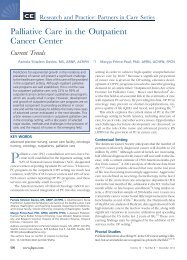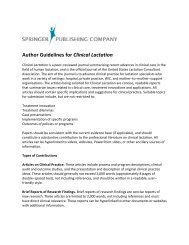Chad Boult, MD, MPH, MBA. - Springer Publishing
Chad Boult, MD, MPH, MBA. - Springer Publishing
Chad Boult, MD, MPH, MBA. - Springer Publishing
Create successful ePaper yourself
Turn your PDF publications into a flip-book with our unique Google optimized e-Paper software.
8 Guided Care<br />
that target older patients with multiple chronic conditions have reported<br />
little benefit. Significant obstacles to success have included lack of adherence<br />
to evidence-based “best practices” and poor coordination with<br />
primary care in planning care and sharing information (Pacala et al.,<br />
1995).<br />
Disease management programs have sought to improve the quality<br />
and outcomes of health care for chronically ill populations defined<br />
by specific diagnoses. Disease management programs identify eligible<br />
patients from insurance records, compile extensive information about<br />
their health, and use it to monitor, educate, empower, and remind (usually<br />
by telephone) patients to engage in behaviors that are likely to lead<br />
to desirable health outcomes. They also send current clinical information<br />
about patients and guidelines for treatment to patients’ physicians<br />
to encourage them to follow best practices in treating chronic conditions<br />
like diabetes and heart failure. Studies of disease management programs<br />
for nonelderly patients have reported improvements in outcomes,<br />
but most studies of disease management for older patients with several<br />
chronic conditions have reported effects on costs that are inconclusive,<br />
negative, or difficult to apply to the general population of older persons<br />
(Holtz-Eakin, 2004; Ofman et al., 2004).<br />
In the Centers for Medicare & Medicaid Services’ large national Medicare<br />
Health Support pilot program (Linden & Adler-Milstein, 2008), disease<br />
management of beneficiaries with diabetes, heart failure, or COPD<br />
failed to achieve the short-term (3-year) cost savings for Medicare that<br />
were required for the program to progress from phase one to phase two.<br />
Thus, the program stopped providing disease management services in<br />
2008 while debate about the interpretation of its results continued.<br />
Other attempts to improve chronic care have been based on the<br />
principle of “pay-for-performance.” In these programs, health care providers<br />
receive bonus payments if they document (usually on insurance<br />
claims) their adherence to preestablished performance standards, such<br />
as prescribing appropriate medications and performing appropriate<br />
laboratory tests, and if their patients adhere to their recommendations.<br />
Studies have confirmed that sufficient payment does induce providers to<br />
increase their documented adherence to the agreed upon performance<br />
standards (Campbell et al., 2007), but the effects of pay-for-performance<br />
on patients’ health status, quality of life, and costs of care remain uncertain.<br />
Unfortunately, it is very difficult to define, document, and reward<br />
excellence in some of the most essential elements of good chronic care,<br />
such as care coordination, proactive monitoring, and patient empow-

















